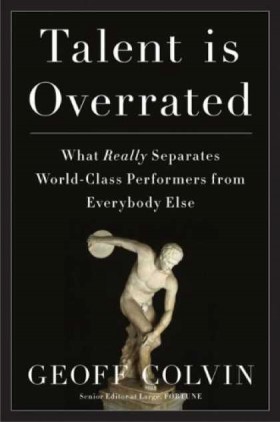Do you believe that talent:
- is a divine spark from a higher source?
- is innate (you’re born with it)?
- can be spotted early, before it’s fully expressed?
- cannot be acquired?
I was hardwired at birth to allocate capital.
—Warren Buffett
Sorry, Warren. According to Geoff Colvin, Fortune magazine editor at large, the only thing hardwired at birth is the drive to get milk from your mama.
In Talent Is Overrated, Colvin explores controversies about talent—including the idea it may not exist.
And something called “deliberate practice” may be more significant. Deliberate practice isn’t mindless repetition. It’s hard. It hurts. And the more you do it, the closer you move to greatness.
Where Did The Idea of Innate Talent Originate?
Colvin traces it to Francis Galton, 19th-century English aristocrat and college dropout. Galton and his peers believed that people came into the world with pretty much the same capabilities, which they developed (or not) throughout their lives. This concept arose from the Age of Enlightenment and the French Revolution—liberté, égalité, fraternité and all that.
Then Galton’s cousin, late bloomer Charles Darwin, published On The Origin Of Species. It inspired Galton to change his tune and write Hereditary Genius, which influenced the next several generations:
I have no patience with the hypothesis…that babies are born pretty much alike, and that the sole agencies in creating differences between boy and boy, and man and man, are steady application and effort.
(Despite the fact that Galton’s cousin Emma Darwin read Milton at age 5, girls and women obviously didn’t count.)
Does Talent Even Exist?
Scientists haven’t yet discovered what all our 20,000-plus genes do. They’ve yet to identify specific genes that govern particular talents.
Psychologist Anders Ericsson, the academic most quoted by Colvin, concludes:
…the search for stable heritable characteristics that could predict or at least account for the superior performance of eminent individuals has been surprisingly unsuccessful.
What About Mozart And Tiger Woods?
Mozart wrote music at age 5, gave public performances at age 8, and composed some of the world’s most beautiful symphonies before his death at age 35. Yet a close look at Mozart’s background reveals:
- His father, Leopold, was an expert music teacher who published a violin textbook the year Mozart was born.
- Leopold systematically instructed Mozart from at least age 3 (probably sooner).
- Mozart’s first four piano concertos, composed at age 11, contained no original music. He cobbled them together from other composers’ works.
- Mozart’s composed his first original masterpiece, the Piano Concerto No. 9, at age 21. That’s a remarkable achievement, but by then he’d gone through eighteen years of intense, expert training.
The New Yorker’s music critic, Alex Ross, sums up recent Mozart scholarship thus:
Ambitious parents who are currently playing the “Baby Mozart” video for their toddlers may be disappointed to learn that Mozart became Mozart by working furiously hard.
Then there’s Tiger Woods, who shot a 48 over nine holes at age 3, appeared in Golf Digest at age 5, broke 80 at age 8 and won six consecutive Junior World Golf Championships. The list goes on. At age 20, he dropped out of Stanford to turn pro, since his peers were no longer competition.
His life parallels Mozart’s in remarkable ways:
- Tiger’s father Earl also was a teacher. Earl became obsessed with golf in this 40s.
- Earl gave Tiger his first metal club, a putter, at age 7 months.
- Earl put a high chair in the garage so Tiger could watch him hit balls into a net. “It was like a movie being run over and over and over for his view,” Earl wrote.
- Earl started taking Tiger to the golf course before age 2, where they played and practiced regularly.
Yet when questioned about Tiger’s amazing career, they both give the same answer: hard work.
Where Does This Leave The Rest of Us?
So your parents didn’t put a violin, golf club or paintbrush in your hand at age 3? According to Ericsson,
the differences between expert performers and normal adults reflect a life-long period of deliberate effort to improve performance in a specific domain.
Ericsson posits it takes 10,000 hours of practice to achieve world-class status. (He’s the originator of the famous 10,000-hour rule the media overstresses.) That’s about 2.75 hours per day for ten years.
And it’s not just any haphazard practice, but “deliberate practice.” Deliberate practice is an activity that:
- specifically improves performance;
- repeats often;
- includes continuous feedback;
- demands great mental focus;
- isn’t much fun.
Years of deliberate practice can actually change the body and the brain, which is why world-class performers are different from the rest of us. But they didn’t start that way.
How Does This Apply to Later Bloomers?
You can start at any time. It just depends on how far between zero and Tiger Woods or Mozart you want to travel.
The first step—identify where you want to go and design a system of deliberate practice.
This includes both general conditioning and specific skill acquisition. For instance, Tiger Woods didn’t just play and practice. He dropped the ball into a sand trap, buried it with his foot, and tried to hit it out. Over and over and over again.
I’ve found some fascinating examples in the Later Bloomer archives:
- Susan Boyle took six years of singing lessons in her 40s. That’s general conditioning. She also performed karaoke in her local pub nightly and sang with her church choir every Sunday — for years. Karaoke and choir singing build specific performance skills and incorporate feedback. Her regimen prepared her for that big break at 48.
- Liz Smith took acting lessons in her 40s. She performed nightly at a family resort and studied improv. Improv is hard. It’s not just reciting lines. Again: Conditioning, specific skills, feedback. She was ready when her big break came at age 50.
For the record, I believe talent exists. I think one day we’ll find genes governing specific abilities. But I don’t think talent is the whole story or even the beginning.
Colvin explores some creative parenting ideas I didn’t cover. He spends more time on business case studies than I’d like (that’s his field after all). He only devotes one chapter to “Great Performance in Youth and Age.” He does confirm, however, that the brain adds neurons throughout our lifetimes, and that deliberate practice enhances the process.
So Warren Buffet, the fellow who says he was “hardwired at birth” to make money, got one thing right. In a 2008 letter to his shareholders he wrote:
I’ve reluctantly discarded the notion of my continuing to manage the portfolio after my death—abandoning my hope to give new meaning to the term “thinking outside the box.”
That’s the only time to stop practicing.

